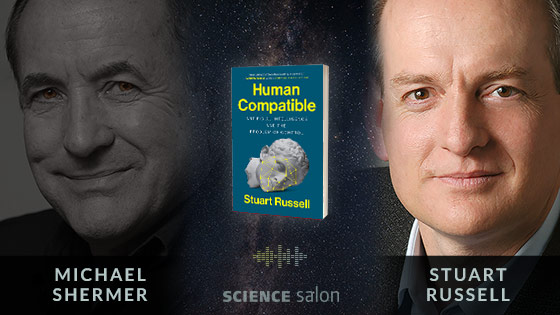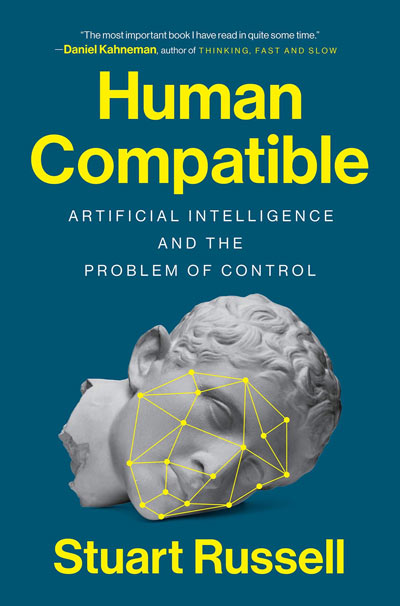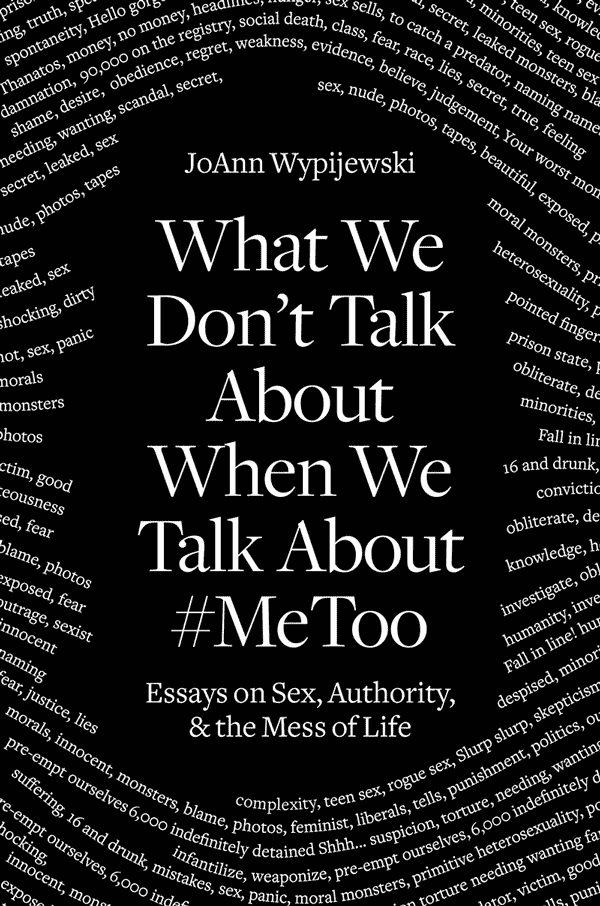SCIENCE SALON # 118
Michael Shermer with Stuart Russell — Human Compatible: Artificial Intelligence and the Problem of Control
In the popular imagination, superhuman artificial intelligence is an approaching tidal wave that threatens not just jobs and human relationships, but civilization itself. Conflict between humans and machines is seen as inevitable and its outcome all too predictable. In this groundbreaking book, distinguished AI researcher Stuart Russell argues that this scenario can be avoided, but only if we rethink AI from the ground up. Russell begins by exploring the idea of intelligence in humans and in machines. He describes the near-term benefits we can expect, from intelligent personal assistants to vastly accelerated scientific research, and outlines the AI breakthroughs that still have to happen before we reach superhuman AI. He also spells out the ways humans are already finding to misuse AI, from lethal autonomous weapons to viral sabotage. If the predicted breakthroughs occur and superhuman AI emerges, we will have created entities far more powerful than ourselves. How can we ensure they never, ever, have power over us? Russell suggests that we can rebuild AI on a new foundation, according to which machines are designed to be inherently uncertain about the human preferences they are required to satisfy. Such machines would be humble, altruistic, and committed to pursue our objectives, not theirs. This new foundation would allow us to create machines that are provably deferential and provably beneficial. Shermer and Russell also discuss:
- natural intelligence vs. artificial intelligence
- “g” in human intelligence vs. G in AGI (Artificial General Intelligence)
- the values alignment problem
- Hume’s “Is-Ought” naturalistic fallacy as it applies to AI values vs. human values
- regulating AI
- Russell’s response to the arguments of AI apocalypse skeptics Kevin Kelly and Steven Pinker
- the Chinese social control AI system and what it could lead to
- autonomous vehicles, weapons, and other systems and how they can be hacked
- AI and the hacking of elections, and
- what keeps Stuart up at night.
Stuart Russell is a professor of Computer Science and holder of the Smith-Zadeh Chair in Engineering at the University of California, Berkeley. He has served as the Vice-Chair of the World Economic Forum’s Council on AI and Robotics and as an advisor to the United Nations on arms control. He is a Fellow of the American Association for Artificial Intelligence, the Association for Computing Machinery, and the American Association for the Advancement of Science. He is the author (with Peter Norvig) of the definitive and universally acclaimed textbook on AI, Artificial Intelligence: A Modern Approach.
Listen to the podcast via Apple Podcasts, Spotify, Google Podcasts, Stitcher, iHeartRadio, and TuneIn.
You play a vital part in our commitment to promoting science and reason. If you enjoy the Science Salon Podcast, please show your support.
THE GREAT COURSES PLUS
Get your free trial today
The Great Courses Plus makes lifelong learning and personal enrichment available to anyone, anywhere. Content-rich, unique courses provide you with a world of knowledge designed to expand your horizons, and deepen your understanding of hundreds of subjects. The Great Courses Plus has helped millions of lifelong learners take their learning to the next level.
Every course is thoroughly researched, extensively examined, and beautifully produced. The Great Courses specializes in crafting customized and entertaining learning journeys that are comprehensive, factual, and fascinating.
Sign up now using my special URL: thegreatcoursesplus.com/salon.
Get unlimited access to engaging and immersive learning experiences when you start a free trial today. Listen or watch on your TV, laptop, tablet, and smartphone. Pause, rewind, fast forward, or re-watch as often as you, and never listen to commercials.
In the following column social psychologist Carol Tavris discusses two new books whose authors separate what’s right in the pursuit of justice from what’s self-righteous. As skeptics, they repudiate received wisdom and party loyalty, showing that by separating what we wish for from wishful thinking, we can find better, more creative, more flexible routes to attaining the former.
Travels Within the Feminist Divide
In this exhausting era of polarized politics and the vengeful moralists who seek not only to bring down the other guy but also the guy on their side who dares to deviate one centimeter from the correct position — theirs — I am happy to report the publication of two books that will restore your faith in rationality: JoAnn Wypijewski’s What We Don’t Talk About When We Talk About #MeToo: Essays on Sex, Authority, and the Mess of Life; and Judith Levine and Erica R. Meiners’s The Feminist and the Sex Offender: Confronting Sexual Harm, Ending State Violence (both from Verso).
The authors blow up the predictable, comforting categories of our side/their side, left/right, progressive/reactionary, and take us on an illuminating journey into complexity, ambiguity, and uncertainty. Over and over, they show why the ends do not justify the means, not when the means require the sacrifice of innocent lives on the altar of moral purity, not when the means require inflexible obedience to dogma, and most certainly not when those means worsen the problem they are meant to solve. As feminists, they separate what’s right in the pursuit of justice from what’s self-righteous. As skeptics, they repudiate received wisdom and party loyalty, showing that by separating what we wish for from wishful thinking, we can find better, more creative, more flexible routes to attaining the former.
Wypijewski’s What We Don’t Talk About When We Talk About #MeToo consists of 16 deep dives into events we thought we understood, revealing “the mess of life” in all its glorious refusal to be squeezed into convenient boxes. A tireless investigative journalist, Wypijewski travels to cities, small towns, and courtrooms to give us the full stories that “exist in the region of raw emotion, the region of danger and fury. Here be demons.” And quite an assortment of demons it is. Her list includes Father Paul Shanley, who was unjustly imprisoned during the priest sex scandals; drunken college students expelled or incarcerated after #MeToo allegations; the murderers of Matthew Shepard (the gay college student whose killing became the prototypical homophobic hate crime), Nushawn Williams (a 21-year-old HIV-positive small-time drug dealer who was accused of deliberately infecting the young women he’d had sex with), former South Carolina governor Mark Sanford, who dared have a “scandalous” affair that riled supporters as well as detractors, and, of course, Woody Allen.
The pursuers of these demons, Wypijewski writes, “may be on the political right, but often they are liberals or professed progressives. The demon may be guilty or not; the crime, grievous, nonexistent or anywhere on a scale of harm. Rage unites them. Bombast is the conventional linguistic mood. Falling in line is the objective.” Enemies vary: rich, poor, immigrants, white males, black males, and teenagers who behave like stupid, drunken, bullying, sexual…teenagers. Whoever their target, the mob revels in the excitement of scandal and retribution, which has become “ordinary, terrible fun. Mercy is the scandal now.” […]













